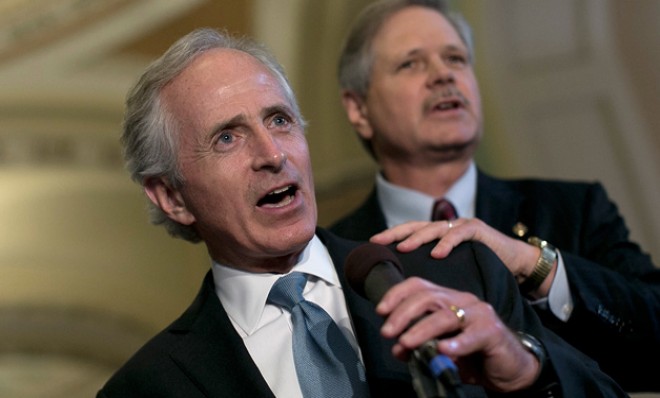The Senate immigration bill: Do we finally have a deal?
The legislation is poised to receive overwhelming support in the Senate. The House is another matter


A free daily email with the biggest news stories of the day – and the best features from TheWeek.com
You are now subscribed
Your newsletter sign-up was successful
The Senate is one huge step closer to passing a comprehensive immigration reform bill, reaching an agreement on a border-security amendment that could convince a large number of Republicans to support the broader legislation.
Sens. Bob Corker (R-Tenn.) and John Hoeven (R-N.D.) introduced the amendment to the Gang of Eight's bill on Thursday, which would double the number of federal agents patrolling the border, spend $3.2 billion on technology upgrades and drone equipment, and require 700 miles of new fencing. Corker predicted the new measure would win support from leery border hawks, saying the amendment was so tough it was "almost overkill."
Already on Thursday, there were signs the new measure could serve as a major breakthrough in the negotiations. Senate Majority Leader Harry Reid (D-Nev.) said the Senate had made "significant advances" in fine-tuning the bill. And in a sign of how far the new measure could go toward winning crucial Republican support, Sen. Mark Kirk (R-Ill.) said Thursday he now planned to back the bill should it include that amendment.
The Week
Escape your echo chamber. Get the facts behind the news, plus analysis from multiple perspectives.

Sign up for The Week's Free Newsletters
From our morning news briefing to a weekly Good News Newsletter, get the best of The Week delivered directly to your inbox.
From our morning news briefing to a weekly Good News Newsletter, get the best of The Week delivered directly to your inbox.
"This bipartisan compromise will restore the people's trust in our ability to control the border and bring 525,000 people in Illinois out of the shadows," he said in a statement. "Once the Senate adopts our amendment, I will be proud to vote for a bill that secures our border and respects our heritage as an immigrant nation."
The amendment's unveiling came days after a Congressional Budget Office report offered fiscal conservatives another reason to get behind the legislation. The report found that the immigration bill could pare the deficit by almost $200 billion over the next 10 years, and by another $700 billion over the following 10.
Supporters of the bill are giddy at the prospect of securing a super-majority of support in the Senate — upwards of 70 votes.
That would ostensibly put immense pressure on the GOP-led House to pass the bill, or at least let it come up for a vote. But any optimism has been curbed by the intransigence of the House's conservative wing. As Politico's Jake Sherman and Seung Min Kim put it, the House is operating in a "parallel universe" from the Senate.
A free daily email with the biggest news stories of the day – and the best features from TheWeek.com
If 70 to 80 senators vote for the bipartisan bill — which some in the Senate are aiming for — the House would barely feel pressure to take up the bill. Most conservatives instead would see passing the legislation as an act of mass stupidity.
"I don't know, Mother always told me that if 70 people jump off a cliff, you shouldn't follow them," Rep. Tom McClintock (R-Calif.) said. Rep. Raul Labrador, an Idaho Republican respected on immigration issues, mocked fear of a large Senate vote, saying, "Oooh, I'm scared." [Politico]
Speaker John Boehner (R-Ohio), whose leadership is looking shakier by the day, has said he won't bring the bill for a vote unless he has the support of a majority of Republicans in the House. On Thursday, he reiterated that position, and stressed that for any bill to pass it would have to be "grounded in real border security."
However, he would not comment on whether the new amendment would reach that threshold, saying he and his fellow GOP House members would need to first take a closer look at that amendment's specifics.
Jon Terbush is an associate editor at TheWeek.com covering politics, sports, and other things he finds interesting. He has previously written for Talking Points Memo, Raw Story, and Business Insider.
